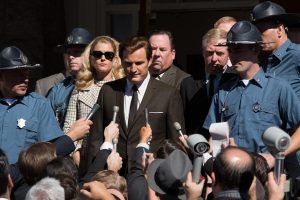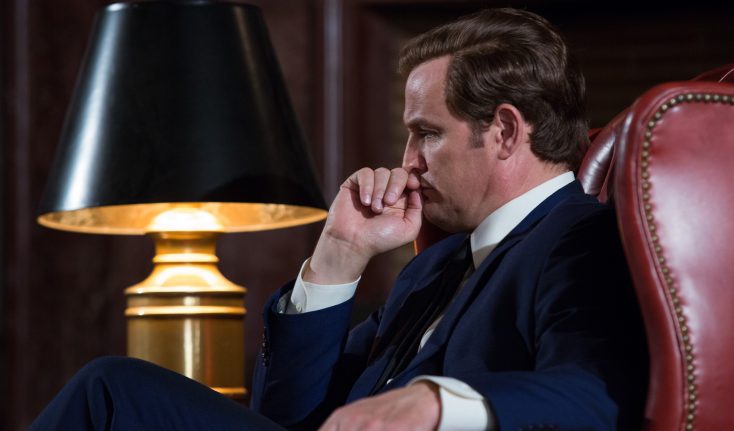
(center, l-f) Andria Blackman as Joan Kennedy and Jason Clarke as Ted Kennedy in CHAPPAQUIDDICK. ©Entertaiment Studios. CR: Claire Folger.
By ANGELA DAWSON
Front Row Features
HOLLYWOOD—Having recently starred in the Oscar-nominated post-World War II drama “Mudbound,” Australian actor Jason Clarke is on a roll delving into characters from America’s checkered past. In “Chappaquiddick,” he depicts young Sen. Edward “Ted” Kennedy, a rising star in the political arena in 1969, whose career is nearly derailed one night when he and a pretty campaign worker wind up submerged in a Massachusetts creek when his car runs off the road. While Kennedy escaped harm, the young woman, Mary Jo Kopechne, a member of the senator’s campaign staff, died. Speculation and facts about the incident and what Kennedy did and should have done that night have stirred controversy in the ensuing five decades. Though Kennedy went on to become a leader in the U.S. Senate for decades, his dream of being elected President came to a screeching halt that night on Chappaquiddick Island. He received a two-month suspended jail sentence for his part in the accident. The news was overshadowed by the Apollo 11 moon landing a few days later.
The even-handed and carefully researched drama directed by John Curran and co-written by Taylor Allen and Andrew Logan also stars Ed Helms, Jim Gaffigan, Clancy Brown, Taylor Nichols, Olivia Thirlby, Bruce Dern and Kate Mara as Kopechne.
Clarke, who bears a ruddy resemblance to the late Senator and was born one day before the fatal accident took place, spoke about taking on the role, and why the subject matter appealed to him.
Q: Having grown up in Australia, what interested you about this role and playing one of the most iconic figures in recent American politics?
Clarke: It was a long process for me to actually know that I wanted to do it. I was wondering, “Can I do it? Should I do it?” I love the time period and the history. I love that and the politics. I love world events and local politics.
I read the script on a plane and the conundrum of this man and how he came out from this early act here of a woman dead in a car that he’d caused, to his televised speech at the end and being elected to the Senate again. I just thought, “Holy ****. How does this happen?” I was very upset about it. It was a long, international flight so I put the script down, and my wife said, “Do you like it?” I said, “I don’t know. I don’t really know what it’s about. I don’t know how to talk about it. I’m a bit confused.” Then I read it again off the plane, and I thought, “Come on, man. This is not real. This couldn’t have happened like this.” Then I went down the rabbit hole, and everything from the fact that there was a very good chance that Mary Jo was still alive (when he left the scene) just made it even more … I don’t even know how to play this now. How do I play a guy that does this early on? How is anybody going to watch that?
Then, when I read in the script that he wore a neck brace at her funeral, I thought, “Come on.” But there are photographs you can see from the newspapers. He actually did wear it. Then he turned around. The story just never let me go. The more I went into this event and what came after it to where we are now, it kind of just related to me. I thought, “You know what? It makes sense where we are now.” Has much changed?
Q: Did you watch footage of Ted Kennedy from that era for your research?
Clarke: Ted had just seen his second brother shot in the head. I listened to Ted’s eulogy. This gives you some context of possibly the clinically depressed state that Ted was in, or at least having an existential crisis. Then, you still come back to this event and you read what he did afterwards, and I just could never connect the tissue, but yet that was what made it so compelling for me.
Q: Did you ever meet Ted Kennedy?
Clarke: I met him very quickly at a boat race years ago, in Hyannisport. I was shooting a series called “Brotherhood” for Showtime and I was playing a politician. I was playing a Democratic politician who also was Catholic. The locals there are very friendly. They’re very welcoming, but it’s a small, tight-knit community. They were having the Figawi boat race. It’s a fun race where everyone’s drinking and sailing and the object is not just to win but to have fun. Somebody said, “Senator Ted Kennedy’s over there if you’d like to meet him.” I said, “Well yeah, I’d love to.” So, yeah, I’d known as much as I could about the Kennedys but the more you go down the rabbit hole, there’s so much to read and understand about him.
Q: This film is likely to open some old wounds. What do you think audiences will get out of it?
Clarke: The message of the film is polarization gets you nowhere. If you want to hate Ted coming into this, you’re going to hate Ted coming into this. If you want to be blinkered to what Ted did, then you’ll be blinkered to what Ted did. It’s hard to watch this and be blinkered though, because we don’t go into the salacious or the trivial. It’s not about whether Ted had sex on the beach with Mary Jo—and I mean that with no disrespect—but this film is not about that. It’s about this man’s moral choices and his journey in making those moral choices. Then, hopefully you get that it feeds out into the rest of society, so it doesn’t just sit with one man. John (Curran, the director) has left this film very obvious at the end with real interviews about what people decided to do or how they would act in the coming elections (from that era).
You can connect the dots of polarization going back to, “Well, he got away with this, he got away with that, so why shouldn’t I get away with this?” Now you’re seeing people continually, it doesn’t matter whether they are white men of privilege or people of leadership just getting away with it on a political level. It’s not that they do or they can. It’s that’s obviously what’s going on. The belief is, “If I can I will, and why shouldn’t I?”
Q: You didn’t do a complete Gary Oldman-type transformation did with Winston Churchill for “Darkest Hour” to play Kennedy in this film. Was there discussion about makeup or prosthetics, or were you always just going to go with the face God gave you?
Clarke: It was, but I had (false) teeth in. I had little plumpers (in my cheeks) and I had a wig. It was a very deliberate choice not to go for prosthetics. This story resides on an emotional level and on a moral and intellectual level. You had to accept very quickly that this man is Ted Kennedy. Or this man is a man going through this who happens to be Ted Kennedy. John (Curran) and I did not want somebody to go, “There’s Jason Clarke in prosthetics.” I don’t have Ted’s big teeth. Mine are small and crooked, so it took months of prosthetic work to get the teeth to fit in my mouth so I wouldn’t have a lisp or it wouldn’t hurt. They did a clip in. Initially, we made them too big for my jaws so it looked odd. It was a delicate process.
John (Curran) said, “What about contacts?” and I said, “No, I think that’s a line too far. I want my eyes.” At the end, you want to be able to bring the audience in, just to feel that you can go on this journey with me. Come up for air in the middle of the night and go, “I’m alive. Hang on, there’s somebody else in the car.” And then what would you do?
Q: Can you talk about getting the Kennedy accent?
Clarke: It was months of just drills and working with a dialect coach; it’s so specific. Then to put the teeth in, because I couldn’t dentalize my T’s for a long time. I listened to a lot of speeches. I listened to one of Bobby’s speeches. Jack’s speeches. The eulogy. I mean Ted’s eulogy at Bobby’s funeral is heartbreaking.
Q: What was your opinion of the character while you were playing him?
Clarke: I always believe that I’m not going to judge my character or there’s no point in doing it. There’s a point to playing these people and the audience should see them, but judgment is silly. I have to play it. I have to be it. If I’m not going to go with me, why is anybody else going to go with me? Then that becomes the film which tells a story, which is usually and hopefully bigger than just one person.





